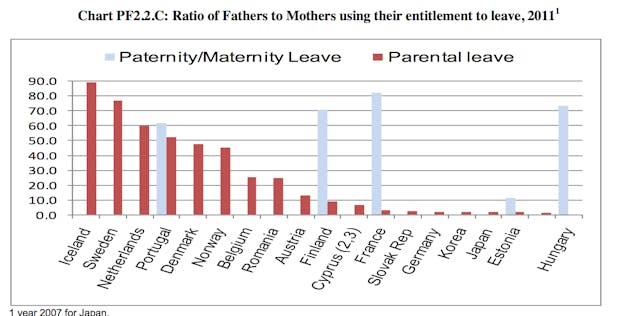Would more generous paternity leave policies help millennial men live out their gender-egalitarian ideals? Quite possibly, according to a recent New York Times write-up by Claire Cain Miller. While millennial men have the most gender-egalitarian views of any generation to date, Miller explains, they often fail to live up to their non-traditional ideals when parenting because “workplace policies have not caught up to changing expectations at home.” Miller considers a study conducted by sociologists at the University of Texas at Austin and the University of California Santa Barbara, which found that “seemingly gender-traditional work-family decisions are largely contingent on the constraints of current workplaces.” In other words, millennial dads would prefer equal partnerships, but find themselves limited to more traditional parenting styles by the dearth of strong paternity leave policies in the United States.
Drawing upon the work of sociologists concerned with work, family, and potential obstacles to gender egalitarianism in society, Miller points out that surveys tend to show that the offer of flexible work policies (such as paid paternity leave) can impact what sort of partnership men and women choose. “When offered supportive policies,” Miller writes, “95 percent of college-educated women chose an egalitarian relationship, 30 percentage points more than when they were not offered supportive policies… Yet in the face of constraints that made equality difficult, their choices aligned with traditional gender roles.”
It is a pity that all we can offer working parents in the United States are survey questions about what they would do if they had generous parenting benefits, like paid maternity and paternity leave. But we do know how such policies play out in terms of gender in many other countries: Even in Finland, Norway, and Sweden, which have generous parental benefits (including paid and protective paternity leave), men don’t tend to take paternity leave at the same rates that women take maternity leave. In other words, great paternity leave doesn't necessarily zap traditional (or traditional-esque) parenting styles, though they do seem correlated with overall gender egalitarianism.
A 2011 OECD Social Policy Division paper measured the ratio of dads to moms using their parental leave at any given time. (The paper also reviewed how many fathers were using their paternity leave compared to how many mothers were using their maternity leave, as some countries feature both neutral parental leave—to be used by either parent—along with specific maternity and paternity policies.)

In every country measured, fewer fathers than mothers made use of their leave. The pattern of fewer fathers using allotted time off held even in countries where post-baby benefits for men tend to be fairly generous: in Sweden, 77 fathers took leave for every 100 mothers; in Norway, about 45; and in Finland, about 13, though about 70 took their shorter, better paid paternity leave. Iceland, at the top of the heap, still saw only about 89 fathers taking time off for every 100 mothers.
The reasons for this disparity are unclear, and likely include a number of factors. One common concern in America is that fathers are stigmatized for taking time off to help out with new babies. Yet the Nordic countries covered in the OECD’s take-up comparison are routinely ranked among the most gender egalitarian nations in the world, which suggests that old-fashioned sexist stigma likely can’t fully account for the disparity in their take-up rates. And neither can an absence of generous leave policies.
What the Nordic example demonstrates is that America appears to have somehow gotten its progress backwards, with traditional gender roles dissolved in the home but enforced by the state and market. Meanwhile, Nordics appear happy to lean a little toward the traditional side at home, with moms taking more time off post-baby than dads, while enjoying vastly less sexist governmental and employment policies when it comes to taking parental leave.
If Nordic countries score high in gender equality and high in parental benefits for moms and dads, while still showing some gender gaps in leave-taking, then perhaps millennial dads aren’t doomed to give up their egalitarian ideals even if they elect not to take as much time off as moms post-baby. Parental leave for fathers is a good idea regardless of how individual families elect to portion out their leave, and fathers choosing to take less time off doesn’t seem to make the Nordic states any less egalitarian. The key to overall gender egalitarianism isn’t how individual families choose to take advantage of the policies offered to them, in other words, but that the policies are ensured by the government to begin with.
